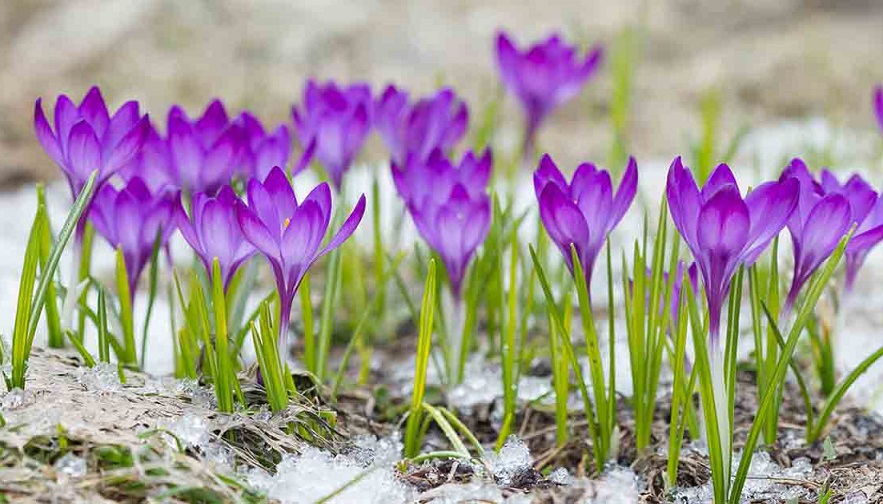.
You meekly poke your purple heads
Through stubborn clumps of snow
That yet persist in fallow beds
Though balmy breezes blow;
First to hail the waxing sun,
First to scent the air,
First to paint the lifeless dun
With a stroke of flair.
So unassuming, small, and frail,
Yet bold beyond compare:
Alone you blaze the new year’s trail
For blooms that not yet dare.
Vanguard of awaited spring,
Heralds of rebirth,
Prophets of the quickening
Of the lifeless earth:
Your advent tells the omens true:
Spring comes! The hopeful soul
Exults to see it now renew
The world that winter stole.
.
.
Adam Sedia (b. 1984) lives in his native Northwest Indiana, with his wife, Ivana, and their children, and practices law as a civil and appellate litigator. In addition to the Society’s publications, his poems and prose works have appeared in The Chained Muse Review, Indiana Voice Journal, and other literary journals. He is also a composer, and his musical works may be heard on his YouTube channel.
















Enjoyed very much.
I thought that was pretty amazing.
Quite lovely! The last line is exquisite!
I love the music and spirit of this poem…Allegra
A lovely spring flower poem, thank you! Thinking of flowers is always a good and healthy thing to do.
Mr. Sedia,
You make me realize I should add crocuses to the poetic bouquet I started a while ago. But my effort won’t touch the caliber of yours!
A very sweet, exquisite poem. I enjoyed this — especially “prophets of the quickening of the lifeless earth.”
Like your lilies’ poem that I read elsewhere, this one features the power of a good, unexpected final line to change focus while satisfactorily closing a very pleasing picture.
This is a truly beautiful lyrical nod to those seemingly delicate, floral indicators of Spring that always fill my heart with joy. You have done them every justice with your superbly woven words. Thank you!
Many of us, Adam, cannot grow crocus because many rodents (especially chipmunks) love to dig up and eat the corms. This herald of spring is really a sacrificial plant perpetuating a rise in the ambient rodent population. It is other things as well, but if you can’t protect it, then it will soon disappear from your life.
When we consider Mr. Sedia’s larger body of work, poems like Chrysanthemums, Crocuses, Orchid, Waves, Nebula,The Seashell, we see that Mr. Sedia is a poet who is truly in touch with the universal poetic spirit in all things.
Thank you for sharing!
Adam, your poem is crisp and light, matching the early Spring air into which the crocuses emerge. The repetition of rhymes in stanzas two and three is an interesting and appealing feature of this piece.
Thank you, everyone, for the comments. This poem stemmed from one of the many fleeting inspirations I have, and I’m happy to see it brought enjoyment to you.